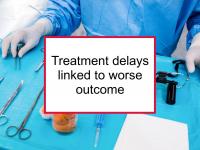Undue delays between breast cancer treatment steps have been reported to be associated with less favorable outcomes, although not all studies are in agreement. A delay potentially can occur simply as a result of scheduling problems each time a women transitions between different treatment providers.
However, delays appear to be more common for older breast cancer patients, as well as those who are African American or economically disadvantaged. Women with more aggressive types of breast cancer (e.g., triple negative (ER-/PR-/HER2-), HER2+, or inflammatory breast cancer (IBC)) are more vulnerable to the potentially adverse effects of treatment delays.
Delays between a diagnosis of breast cancer (using needle biopsy) and neoadjuvant chemotherapy (chemotherapy designed to shrink a tumor before surgery) have been linked to worse outcomes. Now a new study has reported that delays in neoadjuvant chemotherapy of more than 60 days after breast cancer diagnosis are associated with increased risk of death.
Latest research links delay to increased risk of death
The study referenced above was designed to investigate whether time between diagnosis and beginning of neoadjuvant chemotherapy is associated with survival. Women selected to undergo neoadjuvant chemotherapy normally have breast cancer with high-risk features, a fact that the authors took into account in performing the analysis. The study included 5,137 patients treated for invasive primary breast cancer (stage I–III) with neoadjuvant chemotherapy at MD Anderson Cancer Center between 1995 and 2015. The women were divided into three groups according to days from breast cancer diagnosis to neoadjuvant chemotherapy: 0 to 30, 31 to 60, and at least 61 days. Participants were followed for a median of 6.9 years.
The five-year overall survival was 87% for those who started neoadjuvant chemotherapy within 30 days, 85% for 31 to 60 days, and 83% for more than 60 days after diagnosis. Further analysis showed that the association between delay in neoadjuvant chemotherapy and increased risk of death was statistically significant for patients with stage I or stage II breast cancer (but not stage III), and among patients with HER2+ tumors. The authors conclude that a delay in neoadjuvant chemotherapy of more than 60 days after breast cancer diagnosis is associated with increased risk of death. Early initiation of neoadjuvant chemotherapy should be a priority, according to the authors.
Please see our treatment delays tag for more information.
